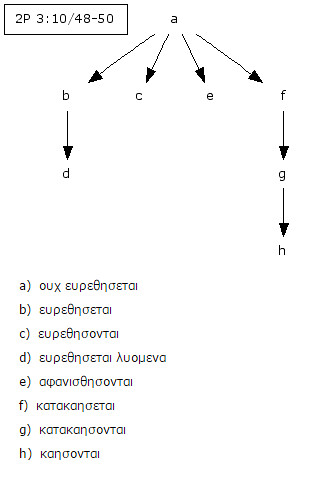Com'è noto 2Pt 3,10 viene tradotto in maniere assai diverse dagli studiosi odierni:
C.E.I.:
Il giorno del Signore verrà come un ladro; allora i cieli con fragore passeranno, gli elementi consumati dal calore si dissolveranno e la terra con quanto c'è in essa
sarà distrutta.Nuova Diodati:
Ora il giorno del Signore verrà come un ladro di notte; in quel giorno i cieli passeranno stridendo, gli elementi si dissolveranno consumati dal calore e la terra e le opere che sono in essa
saranno arse.TNM
Tuttavia il giorno di Geova verrà come un ladro, in cui i cieli passeranno con rumore sibilante, ma gli elementi, essendo intensamente caldi, saranno dissolti, e la terra e le opere che sono in essa
saranno scoperte.
Alcuni manoscritti, e specificamente i più numerosi antichi e affidabili, riportano che la terra e le opere in essa contenute "saranno scoperte" (εὑρεθήσεται), altri manoscritti riportanoinvece il testo "saranno arse" (κατακήσεται), altri ancora “svaniranno” (ἀφανισθήσονται), altri “saranno trovate dissolte” (εὑρεθήσεται λυόμενα), e ciò solo per dire delle varianti principali.
Il fatto che il testo sia particolarmente martoriato nei manoscritti, e che ci siano sei o sette varianti per questo passo, mostra che il testo così com'è stato tramandato dai manoscritti più antichi non sembrava aver molto senso neppure per i lettori madrelingua. L'ipotesi che si fa solitamente è che "le opere saranno scoperte" sia una sorta di uso di un lessico tecnico-giuridico, ove la terra "sarà scoperta" equivarrebbe a "sarà sottoposta a prova", come un imputato lo è da un tribunale. Il senso è tuttavia congetturale, e non viene recepito da un lettore contemporaneo a digiuno del lessico forense greco.
Negli ultimi 20 anni comunque, visto che il testo greco tràdito ha un senso solo tirandolo per i capelli, alcuni filologi hano congetturato che nella ricopiatura del testo (o forse addirittura nell'autografo) sia stato omesso un "non", oggi non più presente in nessun manoscritto greco superstite. L'ultima edizione del Nestle-Aland, la 28°, riporta dunque: "καὶ γῆ καὶ τὰ ἐν αὐτῇ ἔργα
οὐχ εὑρεθήσεται. (non saranno scoperte\trovate)"
Oὐχ a giudizio degli editori è richiesto dal senso, oltre che essere supportato da alcuni manoscritti copti e siriaci. Il testo dunque in origine avrebbe avuto: “la terra e le opere in essa contenute non saranno trovate".
Questa espressione sarebbe un ebraismo (già attestato nel greco dei LXX), giacché il verbo ebraico נמצא (essere trovato) in ebraico viene usato col senso di "esistere", e dunque "non essere trovato" equivale a "cessare di esistere".
Es: "Si volgerà poi verso le fortezze del proprio paese, ma inciamperà, cadrà,
scomparirà. " (Dn 11,19), che nella LXX è: "ἐπιστρέψει τὸ πρόσωπον αὐτοῦ εἰς τὸ κατισχῦσαι τὴν χώραν αὐτοῦ καὶ προσκόψει καὶ πεσεῖται καὶ
οὐχ εὑρεθήσεται(non sarà trovato)"/ (in eb. יִמָּצֵא)
In questo modo la fine del versetto è coerente con quanto detto all’inizio di esso, infatti esso inizia dicendo che i cieli passeranno e gli “elementi”( στοιχεῖα) saranno dissolti dal fuoco, la conseguenza ovvia è dunque che la Terra, essendo anch’essa composta di “elementi”, sia vaporizzata:
“
in quel giorno i cieli scompariranno con un gran fragore, ma gli elementi, essendo incandescenti, si dissolveranno, e la terra e le opere che sono in essa non saranno trovate (=cesseranno di esistere).”
Questa ipotesi è stata preferita dagli editori del NA28 perché adottandola si spiegano anche tutte le varianti che abbiamo nei manoscritti, le quali invece sarebbero ingiustificabili assumendo come punto di partenza un testo senza il “non”. Qui l’ipotesi ricostruttiva dello stemma delle varianti secondo Gerd Mink che è il principale responsabile del testo delle Lettere cattoliche nel Nestle-Aland.

“…
the ECM records the witnesses of erroneous readings as witnesses for the variants which they represent, albeit defectively. There is even an example where the best witnesses omit a negation (1 Peter 3:10/48-50). Although the preceding passage speaks of the passing away of the heavens, and the dissolution of the elements, and the following verses presuppose the dissolution of heaven and earth (for a new heaven and a new earth are waited for), quite superior witnesses here have the reading ‘the earth and all the works that are therein will be found (εὑρθήσονται [sic; εὑρεθήσεται])’, when logic demands ‘will not be found (οὐχ εὑρεθήσονται [sic])’. The meaning, as a result, is extremely problematic; to my mind the reading does not make sense and must therefore be erroneous. Unquestionably, the hyparchetype of all these witnesses did not have the negation. Now, there are two variants (ἀφανισθήσονται ‘they will disappear’, and κατακαήσεται ‘they will be burned up’), which presuppose and express more graphically a text containing the negation: οὐχ εὑρεθήσονται [sic] ‘they will not be found’. Although it is not preserved in any Greek manuscript, it is probable that the initial text had the negation. Even if these variants which indirectly confirm the negation did not exist, the assumption should still be that the initial text contained the negation required by the sense of the text, even though the negation is not in the graphemic representation of the archetype. To my mind, this is an almost unavoidable conjecture.” (Gerd Mink,
Problems of a Highly Contaminated Tradition: the New Testament. Stemmata of Variants as a Source of a Genealogy for Witnesses, in
Studies in Stemmatology II (ed. Pieter van Reenen and August A. den Hollander; Amsterdam: Benjamins, 2004), p. 27)
Disponibile qui:
https://books.google.it/books?id=BM7xmX ... &q&f=false
Che ne pensate di questa congettura del NA28? Devo dire che rende perfettamente coerente il passo, che inizia con una dissoluzione degli elementi in pieno stile stoico, parlandoci di una
ekpyrosis, e dunque non poteva che terminare con la distruzione della Terra.
Ad maiora



